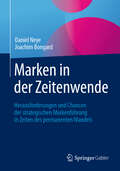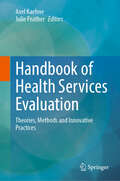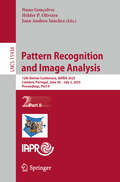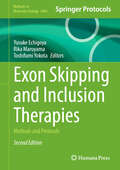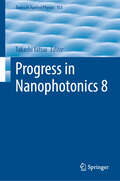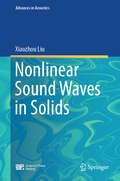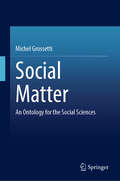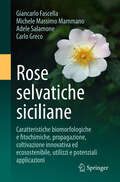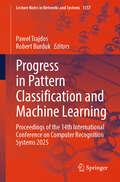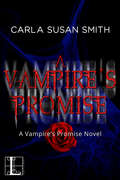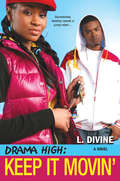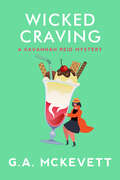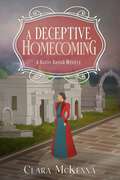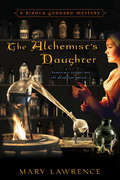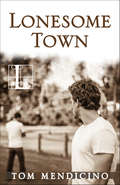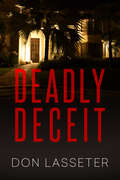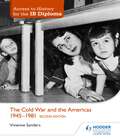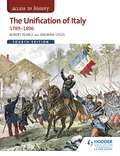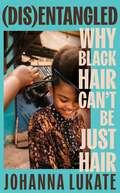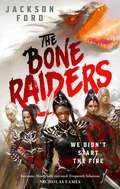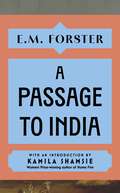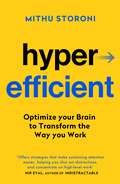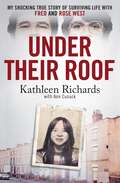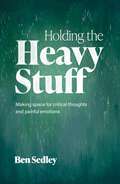- Table View
- List View
Marken in der Zeitenwende: Herausforderungen und Chancen der strategischen Markenführung in Zeiten des permanenten Wandels
by Daniel Neye Joachim BongardDie Welt ist im Dauerkrisenmodus – und Marken sind mittendrin. Ob Klimawandel, künstliche Intelligenz, politische Konflikte oder gesellschaftliche Umbrüche: Unternehmen müssen schneller, flexibler und verantwortungsbewusster agieren als je zuvor und dabei gleichzeitig profitabel sein. Doch wie navigiert man eine Marke durch diese turbulenten Zeiten? Gefragt sind strategische Ansätze, die eine zukunftsfähige Markenführung ermöglichen, ohne dabei die drängenden gesellschaftlichen, ökologischen und wirtschaftlichen Herausforderungen unserer Zeit zu vernachlässigen. Wie das geht, diskutieren die beiden Autoren in diesem Buch. Neben Grundlagen des strategischen Markenmanagements erläutern sie anhand von Beispielen und visionären Konzepten, wie ein ganzheitliches Brand Management von heute und morgen aussehen muss. In diesem Zusammenhang wird auch die grundlegende gesellschaftliche Rolle von Marken sowie die politische und ethische Dimension wirtschaftlichen Handelns im Allgemeinen adressiert. Denn Marken in der Zeitenwende müssen den eigenen Horizont erweitern, die komplexen gesellschaftlichen, ökologischen und wirtschaftlichen Herausforderungen der Gegenwart erkennen und erfolgreich bewältigen, um die eigene Zukunft sichern und gestalten zu können.
Handbook of Health Services Evaluation: Theories, Methods and Innovative Practices
by Axel Kaehne Julie FeatherThis handbook offers a comprehensive overview of the theories, methods and practices in evaluating health services. Written by international experts and practitioners in the field, it is an essential resource for anyone who plans or conducts evaluations of health care organisations, as well as for those who want to learn more about the strengths and limitations of specific evaluation techniques and methods. The individual chapters summarise the latest evidence and good practice of established, tried and tested evaluation approaches as well as novel and innovative evaluation techniques in clinical and health organisational settings. The handbook comprises chapters on a wide range of topics such as digital technologies, leadership in health services, trauma-informed evaluation, harm reduction in evaluation, learning health systems and collective impact design. Each chapter provides a state-of-the-art summary of the current evaluation practice together with up-to-date references to existing published research.
Pattern Recognition and Image Analysis: 12th Iberian Conference, IbPRIA 2025, Coimbra, Portugal, June 30 – July 3, 2025, Proceedings, Part II (Lecture Notes in Computer Science #15938)
by Joan Andreu Sánchez Nuno Gonçalves Hélder P. OliveiraThe two volume set LNCS 15937 + 15938 constitutes the proceedings of the 12th Iberian Conference on Pattern Recognition and Image Analysis, IbPRIA 2025, which took place in Coimbra, Portugal, during June 30–July 3, 2025. The 67 full papers included in the proceedings were carefully reviewed and selected from 115 submissions. They were organized in topical sections as follows: Part I: Computer vision; faces, body, fingerprints and biometrics; machine and deep learning; explainability, bias and fairness in DL; Part II: Natural language processing; biomedical applications; and other applications.
Exon Skipping and Inclusion Therapies: Methods and Protocols (Methods in Molecular Biology #2964)
by Toshifumi Yokota Rika Maruyama Yusuke EchigoyaThis fully updated edition presents a collection of protocols reflecting the latest advancements in exon skipping and inclusion strategies. The book explores the design of antisense oligonucleotide therapies, in vitro and in vivo evaluation of exon skipping in Duchenne muscular dystrophy, enhancing exon skipping efficiency, as well as methods involving spinal muscular atrophy and other diseases. Written for the highly successful Methods in Molecular Biology series, chapters include introductions to their respective topics, lists of the necessary materials and reagents, step-by-step and readily reproducible laboratory protocols, and tips on troubleshooting and avoiding known pitfalls. Authoritative and comprehensive, Exon Skipping and Inclusion Therapies: Methods and Protocols, Second Edition serves as a valuable resource for scientists working to refine RNA-targeted therapeutics and translate them into clinical applications.
Progress in Nanophotonics 8 (Topics in Applied Physics #153)
by Takashi YatsuiThis book features a collection of reviews focusing on interrelated topics in nanophotonics, nanotechnology, nano-optics, and near-field optics written by some of the world's leading scientists in these fields. This book discusses recent developments both fabrication and applications of nanomaterials with sub-nanometer scale. Additionally, it reviews selected topics in the areas of THz nanoscopy and ultrafast spectroscopy of nanomaterials. This book also reviews recent advances in low-threshold silicon Raman lasers based on high-Q photonic crystal nanocavities. Finally, this book reviews artificial structural colours, emphasising both physical effects and fabrication issues.
Nonlinear Sound Waves in Solids (Advances in Acoustics)
by Xiaozhou LiuThis book highlights the fundamental principles and analytical methods of nonlinear acoustics in solids, with a focus on the theories and applications of nonlinear acoustics in ultrasonic non-destructive testing and metamaterials. The text is designed to provide readers with a deep understanding of how nonlinear acoustic phenomena manifest in various material contexts, from crystalline structures to complex composites. Suitable for readers in the fields of acoustics, materials science, and engineering, this book can advance the development of nonlinear acoustics theory and promote its applications in non-destructive testing, materials sciences, and related areas.
Social Matter: An Ontology for the Social Sciences
by Michel GrossettiThis book helps answer a fundamental question: What is the social world made of? It presents a comprehensive ontology of social entities, activities, and relations. Basic building blocks of the social world, from humans and animals to objects and cognitive entities are explored, while also posing open questions about the status of living beings. By introducing more complex social forms, such as networks and collectives, and examining how these emerge through shared resources and interactions the author applies the familiar social science notions like classes and organizations and explores life courses and causality within social phenomena. As a whole, this book offers an innovative framework for understanding the social world, inviting scholars and readers in philosophy, social sciences, and political sciences to rethink the entities and processes that shape our social reality.
Rose selvatiche siciliane: Caratteristiche biomorfologiche e fitochimiche, propagazione, coltivazione innovativa ed ecosostenibile, utilizzi e potenziali applicazioni
by Giancarlo Fascella Michele Massimo Mammano Adele Salamone Carlo GrecoLe Rose siciliane autoctone costituiscono una ricca fonte di biodiversità finora poco utilizzata (e conosciuta) ma che merita di essere adeguatamente valorizzata. In questa monografia vengono dettagliatamente descritte le quattro specie più presenti in Sicilia, riportando le principali attività sperimentali svolte e i risultati di maggior interesse realizzati dagli autori nell&’ambito di diversi Progetti di ricerca. Nei vari capitoli vengono in ordine descritti: i siti di reperimento e le caratteristiche botaniche delle specie individuate; i protocolli di moltiplicazione gamica (da seme) e vegetativa (da talea e da micropropagazione) per la loro produzione massale; le tecniche colturali per l&’allevamento a basso impatto ambientale e ridotto apporto di input delle rose siciliane; l&’analisi fitochimica dei falsi frutti (bacche o cinorrodi) e delle foglie, entrambi ricchissimi in biomolecole attive di interesse nutraceutico; la lavorazione e la trasformazione di alcune parti della pianta per l&’ottenimento di nuovi prodotti alimentari (conserve, dolci e liquori); la realizzazione di un integratore alimentare multivitaminico; l&’applicazione delle tecniche di agricoltura di precisione alla coltivazione di Rosa canina.
Progress in Pattern Classification and Machine Learning: Proceedings of the 14th International Conference on Computer Recognition Systems 2025 (Lecture Notes in Networks and Systems #1557)
by Robert Burduk Paweł TrajdosThis book highlights recent research on computer recognition systems, one of the most promising directions in artificial intelligence. Offering the comprehensive study on this field to date, it gathers 11 carefully selected articles contributed by experts on pattern recognition.The accepted papers address current computer science and computer systems related technological challenges and solutions, as well as many practical applications areas of pattern recognition and machine learning results.Presenting recent research on methodology and applications, the book offers a valuable reference tool for scientists whose work involves designing computer pattern recognition systems. Its target audience also includes researchers and students in computer science and artificial intelligence. We believe that this book will be also interesting for practitioners in many fields of computer science and IT applications.
A Vampire's Promise (Vampire's Promise #1)
by Carla Susan SmithFirst in the series that continues with A Vampire&’s Soul and A Vampire&’s Honor. &“Wicked fun not to be missed!&”— Rebecca Zanetti, New York Times bestselling author Trust Your Instincts Rowan Harper is nothing but a smart-mouthed bookstore clerk with a crappy love life on the night she walks into Rosie&’s Bar. Most of the drama in her life is borrowed from her best friend&’s adventures. But when she meets Gabriel—tall and movie star gorgeous—everything changes. Never mind that she turns down the drink he offers, or that he brims with secrets she can&’t begin to guess at. He ignites a desire in her she never suspected—and shows a fascination with her she can&’t explain. There is nothing about Gabriel that is ordinary. An aura of mystery cloaks him, even as Rowan grasps for facts, even as she fears an answer that could destroy her happiness. Gabriel can guide her through a wonderland of new sensations. But only if Rowan trusts him enough to follow . . .Winner of the OKRWA &“Finally a Bride&” Contest &“A whopper of a romance. A tale full of zest, sensuality, and the seductive power of two souls truly coming together. A story to captivate you both body and soul!!&” —Addicted to Romance &“Rowan&’s wry commentary about her predicament is priceless, and this romance sizzles . . . This series is highly recommended.&” —Library Journal &“An intriguing story with an excellent blend of fantasy and reality as well as relatable human characters.&” —Night Owl Romance
Drama High: Keep It Movin' (Drama High #8)
by L. DivineA YALSA Quick Pick for Reluctant Young Adult ReadersSouth Bay High's Jayd Jackson finally has her own ride, but that sure doesn't mean her troubles are over. . .These days, Jayd just can't seem to get a break. Her car is more trouble than it's worth; her girl Mickey is being forced to attend continuation school; and Rah and his ex Sandy are still arguing.Despite these distractions, Jayd concentrates on making potions for hair and developing her own signature braid technique, which is getting her a lot of respect and money. But then school starts up again, and with it comes more drama. If Jayd wants to keep it all under control, she'll have to look deep into herself and take her destiny into her own hands. . .
Wicked Craving: A Savannah Reid Mystery (A Savannah Reid Mystery #15)
by G. A. McKevettA weight-loss scammer is suspected of killing his wife in this mystery starring the &“food-loving, witty and down-to-earth&” PI (Publishers Weekly). Savannah Reid may have a few extra curves on her full-figured body, but that hasn&’t stopped her from becoming one of California&’s most successful private investigators. Her latest case puts her hot on the trail of a shady weight loss therapist who&’s made a killing treating—and cheating—his overweight patients. The question is, did he kill his wife, too? Pound for pound, this is shaping up to be one of Savannah&’s toughest cases ever. But she&’d better find the killer soon . . . or else the bodies will just keep piling up . . . &“Solid . . . Savannah&’s wit about food and healthy weight continues to sparkle.&” —Publishers Weekly &“Enjoyable . . . A nice mix of cozy relationships and mystery.&” —Booklist
Furry Friends Forevermore: A Heavenly Reunion with Your Pet
by Gary KurzHow will we meet our beloved pets in the hereafter?Will our pets look and act the same in heaven as they did in life? Will the reunion last for eternity or only for a precious few fleeting moments? While coping with the loss of a cherished pet, solace can be found in knowing that one day we'll meet our furry friends in heaven. But how can the idea of eternity with our devoted companions provide comfort if we don't understand what that future will look like? Drawing on Scripture, Gary Kurz helps grieving people understand the mystery of death, painting a pragmatic, yet comforting portrait of the reunion we will have with God and our animal confidants in heaven.Uplifting, compassionate and wise, Furry Friends Forevermore transforms grief to hope, allowing pet lovers to take comfort in the knowledge that we will indeed meet our cherished best friends once more.Praise for Gary Kurz and Cold Noses at the Pearly Gates"Wonderful, inspiring and comforting. . .a must read if you want to know that without a doubt you will see your pets in heaven." —Mary Buddemeyer-Porter, author of Will I See Fido in Heaven?"A great comfort to me and all I am associated with." —Terry Hickey, Founder, Halton/Peel Pet Loss Support Group
A Deceptive Homecoming: A Hattie Davish Mystery (A Hattie Davish Mystery #4)
by Clara McKennaTraveling secretary Hattie Davish is returning to her once-quiet hometown, where a deluge of deadly secrets leaves her feeling anything but welcome…When her good friend Virginia Hayward’s father passes away, Hattie Davish rushes to her hometown of St. Joseph, Missouri. She’s looking forward to visiting the place where she grew up, even if the circumstances bringing her there are bleak. But upon her arrival, she learns that all is not well in St. Joe. Virginia is cold and distant, Frank Hayward’s death is shrouded in mystery, and a string of troubling incidents have descended on Hattie’s alma mater, Mrs. Chaplin’s School for Women. Frank was the school’s bookkeeper, and as Hattie begins investigating the bizarre goings-on, she becomes convinced that someone other than Frank was in the casket—but who? Her search for the truth takes her from the town cemetery, to the home of an infamous outlaw, to the dungeon-like tunnels beneath the State Lunatic Asylum—and brings her face-to-face with a killer bent on the deadliest lesson of all…
The Alchemist's Daughter (A Bianca Goddard Mystery #1)
by Mary Lawrence&“Unique characters, a twisty plot and a bold, bright heroine . . . Mystery and Tudor fans alike will raise a glass to this new series.&”—Karen Harper, New York Times bestselling authorIn the year 1543 of King Henry VIII&’s turbulent reign, the daughter of a notorious alchemist finds herself suspected of cold-blooded murder . . . Bianca Goddard employs her knowledge of herbs and medicinal plants to concoct remedies for the disease-riddled poor in London&’s squalid Southwark slum. But when her friend Jolyn comes to her complaining of severe stomach pains, Bianca&’s prescription seems to kill her on the spot. Recovering from her shock, Bianca suspects Jolyn may have been poisoned before coming to her—but the local constable is not so easily convinced.To clear her name and keep her neck free of the gallows, Bianca must apply her knowledge of the healing arts to deduce exactly how her friend was murdered and by whom—before she herself falls victim to a similar fate . . .A Suspense Magazine Best Historical Mystery of the Year&“A realistic evocation of 16th century London&’s underside. The various strands of the plot are so skillfully plaited together.&”—Fiona Buckley, author of the Ursula Blanchard Mysteries &“The writing is terrific . . . will keep readers engaged until the very last page . . . a real page-turner.&”—San Francisco Book Review &“Whereas some historical fiction bristles with self-importance, this novel eschews it to excellent effect.&”—Library Journal
Lonesome Town
by Tom MendicinoCharlie Beresford and Kevin “KC” Conroy came of age in Tom Mendicino’s KC, At Bat and Travelin’ Man. Now they’re struggling with the realities of adulthood, in this powerfully honest story of unlikely friendship and enduring love.At twenty-two, Charlie Beresford has a Dartmouth degree, an entry-level radio job, and a hunch that he’s already made one of the biggest mistakes of his life. It’s no wonder his old high-school crush, KC Conroy, is wary when they encounter each other again. Five years ago, Charlie callously discarded him after they shared an intense adolescent affair. This KC is wiser and more worldly than the aspiring baseball star Charlie used to idolize. Back then, fame and success seemed a given. Now KC is chasing his last chance to make it as a pro, playing with an independent minor league team. But Charlie has changed too. Time and distance have taught him what’s worth fighting for, even when the odds are long—and that the only thing worse than striking out might be never taking a chance at all.
Deadly Deceit
by Don LasseterThe chilling true crime story of a man willing to do whatever it takes to live life on his lavish terms—including murder his own parents.Gunned DownAfter years of hard work, Brian and Jeannie Legg had earned a well-deserved life of leisure in their picture-perfect Phoenix mansion. Until their troubled son showed up with a need for cash—and a thirst for murder . . . Two BodiesDavid Legg was an obsessive control freak and an army deserter. After fathering an illegitimate child, he wooed and wed a trusting young woman—only to destroy his marriage with lies and infidelities. But his deceptions were far from over . . . A Savage SonIn June of 1996, Jeannie and Brian were found shot to death, their bodies sitting next to each other on their living room loveseat. Jeannie&’s expensive ring and the couple&’s credit cards were missing. Meanwhile, David, the prime suspect, was living it up in Hawaii with his fifteen-year-old girlfriend, draining his dead parents&’ savings through ATMs. After a long and costly chase this remorseless killer faced a jury of his peers in 2000, and was locked behind bars for life.
Access to History for the IB Diploma: The Cold War and the Americas 1945-1981 Second Edition
by Vivienne SandersA new edition for HL Option 2, History of the Americas, Topic 16: The Cold War and the Americas (1945-1981)The renowned IB Diploma History series, combining compelling narratives with academic rigor.An authoritative and engaging narrative, with the widest variety of sources at this level, helping students to develop their knowledge and analytical skills. This second edition provides:- Reliable, clear and in-depth narrative from topic experts - Analysis of the historiography surrounding key debates- Dedicated exam practice with model answers and practice questions- TOK support and Historical Investigation questions to help with all aspects of the Diploma
Access to History: The Unification of Italy 1789-1896 Fourth Edition
by Robert Pearce Andrina StilesExam Board: AQA, Edexcel, OCR & WJECLevel: A-levelSubject: HistoryFirst Teaching: September 2015First Exam: June 2016Give your students the best chance of success with this tried and tested series, combining in-depth analysis, engaging narrative and accessibility. Access to History is the most popular, trusted and wide-ranging series for A-level History students.This title:- Supports the content and assessment requirements of the 2015 A-level History specifications- Contains authoritative and engaging content- Includes thought-provoking key debates that examine the opposing views and approaches of historians- Provides exam-style questions and guidance for each relevant specification to help students understand how to apply what they have learntThis title is suitable for a variety of courses including:- Edexcel: The Unification of Italy, c1830-70- OCR: Italy and Unification 1789-1896
Disentangled: Why Black Hair Can't Be Just Hair
by Johanna LukateEven before we get to introduce ourselves by name, our hair has already started to tell stories about who we are, where we are from and where we are at. Our hair is tangled up in the interplay of race, gender, class, nationality, sexuality, power and beauty. It is an avid storyteller and a consummate performer - whether we like it or not. If our hair could talk, what stories would it tell about us?(Dis)entangled delves into the intricate and deeply personal relationship between Black individuals and their hair, exploring - through a collection of diverse experiences - the profound significance of hair as a conduit for self-expression, resilience, and collective memory within communities around the world. Each story illuminates the complex tapestry of experiences surrounding Black hair, shedding light on its intersections with gender, race and identity.Through the voices of those who have walked this textured path, the book ultimately seeks to empower readers to embrace their own unique journey of self-discovery, one strand at a time.
The Bone Raiders: The wild and exhilarating epic fantasy (The Rakada)
by Jackson Ford'AWESOME. MASTERFULLY EXECUTED. FREQUENTLY HILARIOUS' Nicholas Eames, author of Kings of the WyldThe start of an edge-of-your-seat, action‑packed epic fantasy series from the irreverent Jackson Ford, where a wild band known as the Bone Raiders harness the power of gigantic, fire-breathing lizards to defend their homeland.WE DIDN'T START THE FIRE . . . BUT OUR GIANT FIRE-BREATHING LIZARDS DID.You don't f*ck with the Rakada. The people living in the grasslands of the Tapestry call them the Bone Raiders, from their charming habit of displaying the bones of those they kill on their armour. But being a raider is tough these days. There's a new Great Khan in the Tapestry. He plans to use his sizeable military to get rid of the raider clans. And then there are the huge fire-breathing lizards that are straying into the grasslands a little too often these days.Sayana is a raider scout. She knows that to protect their way of life, she needs do something drastic. Like convincing her clan to ride those huge lizards, instead of horses. Sayana doesn't know how to do it without being eaten and/or cooked alive, but she'd better figure it out fast - or she and her clan, along with every other raider in the Tapestry, will be wiped out.'A ton of fun. The premise is awesome, the found-family dynamic is masterfully executed, the dialogue is wicked-sharp and frequently hilarious' Nicholas Eames, author of Kings of the Wyld'Ford begins this new series with quirky characters, loads of great action sequences, and his trademark brand of humour' Booklist'The Bone Raiders is a relentlessly cheeky, ofttimes unserious, and undisputedly rip-roaring bit of fantasy that can only be written by Jackson Ford. Badass female protagonists, found family, and giant lizards - what more do you need? Add this one to your TBR. I fully guarantee you'll be entertained' FanFiAddict
A Passage to India: With an introduction by Kamila Shamsie, Women's Prize-winning author of Home Fire
by E M ForsterForster's classic novel, with a new introduction by Kamila Shamsie, author of Home Fire, winner of the Women's Prize for Fiction'There's no writer better than Forster at portraying the genuine feelings that are born from the interaction between one human being and another'KAMILA SHAMSIE'Forster's last and greatest novel'DAMON GALGUT, GUARDIAN'His great book . . . masterly in its prescience and its lucidity'ANITA DESAI'The first time I saw you, you were wanting to see India, not Indians, and it occurred to me: Ah, that won't take us far.'The Indian town of Chandrapore seems to change dramatically season by season, day by day, offering different impressions from each angle it is viewed. Vulnerable to flooding, but blessed by glorious sun, it is surrounded by vast, flat expanses, except for hills to the south that house the extraordinary Marabar Caves.When Mrs Moore and her younger travelling companion Adela arrive in town, they are frustrated and disappointed that all they can find is the claustrophobia of British colonial culture. Then a chance meeting with the charming and well-respected Dr Aziz seems to present the perfect opportunity to fulfil their desire to see the 'real India'. But during a guided tour of the Marabar Caves, a strange incident occurs, resulting in a shocking accusation that throws Chandrapore into a fever of racial tension and the doctor straight into the heart of a scandal from which he might never recover.
Hyperefficient: Simple Methods to Optimise your Brain and Transform the Way you Work
by Mithu Storoni'Read this book! Mithu Storoni's unique strategy doesn't just preserve brain health and longevity, it promises to escalate mental performance to new heights and improve the way we work.' - Dan Buettner, National Geographic Fellow and #1 New York Times Bestselling author of the Blue Zones.Take back control. Optimize your brain. Become hyperefficient.In today's digital age, we move through life at a frantic pace to keep up with the never-ending influx of information and daily tasks. But what if some simple shifts could help boost creativity and optimise how we focus and process data, to elevate our mental performance and productivity?In Hyperefficient, Dr Mithu Storoni lays out the tools to retune our brains to the best settings for complex thinking, concentration, and decision-making. Storoni proposes we impose the rhythm of our brains on our work in order to create the perfect environment for us to thrive individually at work and at home. Rooted in the very latest scientific research, Hyperefficient is a must-have practical manual for your brain.
Under Their Roof: My shocking true story of surviving serial killers Fred and Rose West
by Kathleen Richards Ann Cusack'My stomach was clenched tight. I knew there was no way I could swallow a single morsel. Playing in my mind was a slideshow of evil, fragments of memory, glued together by fear: Fred and Rose West dragging me off the pavement, Fred pinning me on the sofa while Rose stroked my hair, Fred climbing into my bed and assaulting me while I slept...'Kathleen Richards was just 17 when she and her sister Deirdre found themselves on the doorstep of 25 Cromwell Street, Gloucester, seeking lodgings from a seemingly friendly local couple: Fred and Rose West.While growing up in poverty-stricken Dublin in the 1960s, Kathleen was abused from a young age. A move to England allowed her to escape, but even so life remained difficult, forcing her to seek refuge.At first, Cromwell Street provided freedom for the sisters who were entertained by Fred's quirky behaviour. Kathleen was also happy to make a new friend in her fellow lodger, Shirley Robinson.But then, things took a sinister turn: Fred began to abuse Kathleen with his wife's encouragement. And, when Shirley suddenly disappeared too, Kathleen's world began to grow very dark... This is a chilling account of what it's like to come face-to-face with Britain's most notorious serial killers, but it is also an inspiring account of the resilience of women and how to find happiness after trauma.
Holding the Heavy Stuff: Making Space for Critical Thoughts and Painful Emotions
by Ben SedleyHolding the Heavy Stuff is a unique, illustrated self-help guide for anyone who has struggled with low mood, worries, self-doubts or mean thoughts about themselves and then found it difficult to move their life forward.It is for people who feel overwhelmed or consumed by worries about the future, or find themselves stuck reliving moments from their past.It is for those who have days, weeks or months when sadness takes over and getting through each hour feels challenging.It is for those who can't imagine life getting better as the world gets worse.It is for people who feel dumped on or knocked off track.It is for all of us who face tragedy and difficulty and feel weighed down.Perhaps you struggle to live the life you want or are holding too much heavy stuff. The more you try to fight this internal pain, the more you have it. Instead of struggling against it, this book offers a different approach. You will learn ways to carry the heavy stuff with you as you go where you want to go.
